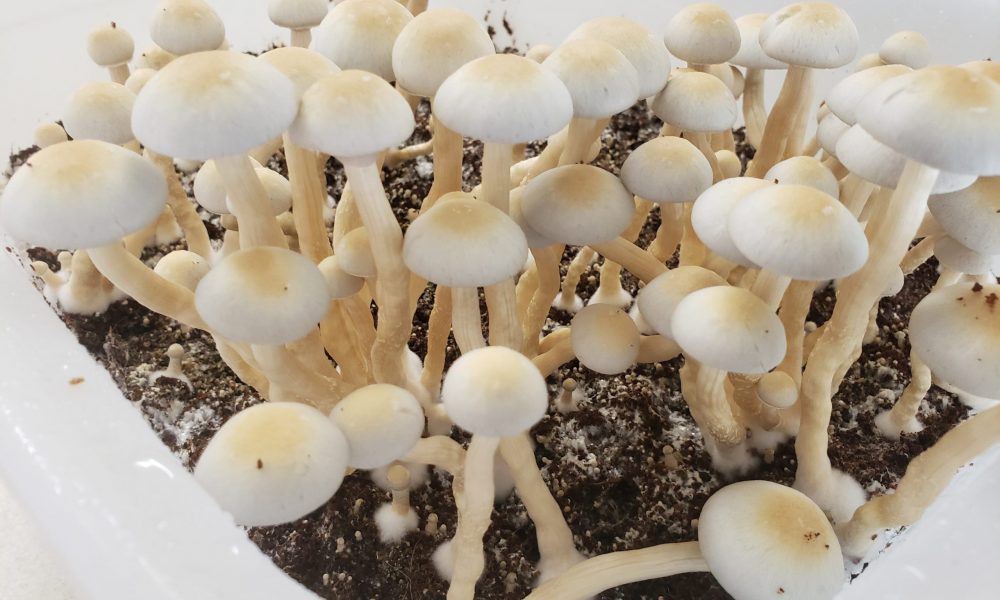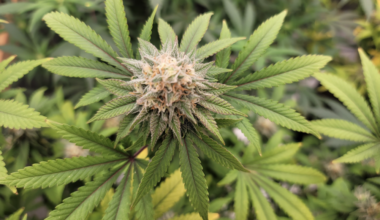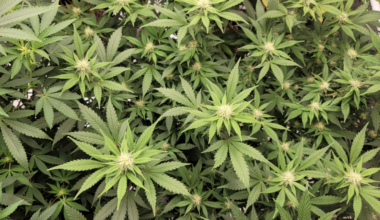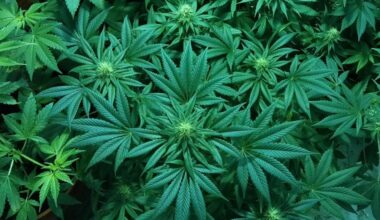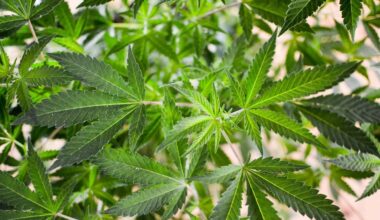With just a month left before the end of New York’s legislative session, lawmakers sponsoring differing psychedelics reform legislation recently participated in a discussion on the path forward for psilocybin in the Empire State.
Assemblymembers Linda Rosenthal (D) and Pat Burke (D) talked about their competing proposals at the virtual symposium, hosted by the Sanctuary for Independent Media, late last month. About 150 people attended the event, with the Zoom chat flooded with activists, doctors and concerned citizens from around the state.
Rosenthal has sponsored two psychedelics reform bills in the legislature: one to create a “psychedelic research institute” tasked with studying the therapeutic potential of the substances for certain conditions and making policy recommendations, and another to broadly decriminalize psilocybin.
“We have more than enough evidence from 7,000 years of use [that psychedelics are effective], but also very mainstream universities where researchers say ‘yes, this works.’ That’s enough for me,” Rosenthal said. “Let’s stop with the interim steps. We’ve waited long enough.”
Burke, meanwhile, is sponsoring A8569, which would legalize the medical use of psilocybin for certified patients in clinical settings. Trained facilitators could obtain the psychedelic through a pilot program that would be established under the measure, or synthetic psilocybin if such a drug is approved by the federal Food and Drug Administration (FDA).
—
Marijuana Moment is already tracking more than 1,000 cannabis, psychedelics and drug policy bills in state legislatures and Congress this year. Patreon supporters pledging at least $25/month get access to our interactive maps, charts and hearing calendar so they don’t miss any developments.![]()
Learn more about our marijuana bill tracker and become a supporter on Patreon to get access.
—
The measure also calls for the creation of a 14-person psilocybin therapy advisory board consisting of experts who would be responsible for issuing recommendations on the use of psychedelics in a medical setting.
The bill as introduced contained broader language legalizing the possession, sale and use of psilocybin by qualifying patients, and it would have specifically established “psilocybin service centers” in the state where the substance could be obtained and administered. But the 23-page measure that was originally filed was replaced last week with a scaled-back, six-page version that doesn’t contain provisions on patient identification cards or pricing for psilocybin products, among other changes.
Both lawmakers’ bills have been referred to committee but haven’t yet been scheduled for hearings or votes.
In any case, the discussion between Rosenthal and Burke at the recent event demonstrated the range of policy changes being considered by legislators with the shared interest of tapping into the therapeutic potential of psychedelics.
Both lawmakers were asked what motivated them to sponsor psychedelic reform legislation.
“There’s a lot of trauma in my community,” Burke, who filed his bill in December with guidance from Assembly leadership, said. “We have a lot of veterans suffering from PTSD in my community, a lot of alcoholism and a lot of violence. There are only so many push-up challenges you can do before you realize everything has to be on the table.”
The event moderator commented that there’s “always been this tension in advocacy communities of whether you go for something that you think the broadest number of your colleagues will be in favor of and do that quickly, or as Assemblymember Rosenthal said, you go for the gold.”
Assemblymember John McDonald (D), a pharmacist, was also brought in to comment during the session. He said that in his practice, he’s “been seeing more and more information the last two or three years coming from peer-review documents” supporting the medical utility of psychedelics.
While federal prohibition has created barriers to studying psychedelics like psilocybin and psilocin, research institutes around the country have stepped up efforts in recent years to explore the possible benefits of these compounds, especially as more jurisdictions move to loosen laws around the substances.
A follow-up event has been scheduled for May 10 for any participants hoping to be active in pushing these bills. If they are not passed by the end of the session next month, all three pieces of legislation will have to be reintroduced next year, when the new legislative cycle begins.
Outside of New York, lawmakers in legislatures across the U.S. are also working to advance psychedelics reform.
For example, Connecticut lawmakers sent the governor a large-scale budget bill on Tuesday that includes provisions to set the state up to provide certain patients with access to psychedelic-assisted treatment using substances like MDMA and psilocybin.
The Colorado Senate approved a House-passed bill last week to align state statute to legalize MDMA prescriptions if and when the federal government ultimately permits such use, sending the measure to the governor.
Maryland lawmakers recently sent a bill to the governor that would create a state fund to provide “cost-free” access to psychedelics like psilocybin, MDMA and ketamine for military veterans suffering from post-traumatic stress disorder (PTSD) and traumatic brain injury.
The Maine Senate approved a bill last month to to create a medical psilocybin program in the state, but the House of Representatives refused to go along.
Also last month, Georgia lawmakers advanced a bipartisan resolution that calls for the formation of a House study committee to investigate the therapeutic potential of psychedelics like psilocybin and make recommendations for reforms.
The governor of Utah signed a bill in March to create a task force to study and make recommendations on the therapeutic potential of psychedelic drugs and possible regulations for their lawful use.
A Missouri House committee also held a hearing that month on a GOP-led bill to legalize a wide range of psychedelics for therapeutic use at designated care facilities while further decriminalizing low-level possession in general.
The Washington State legislature recently sent a budget bill to the governor’s desk that includes a proposal to direct $200,000 in funding to support a new workgroup to study the possibility of legalizing psilocybin services in the state, including the idea of using current marijuana regulatory systems to track psychedelic mushrooms.
In March, the Hawaii Senate approved a bill to set up a state working group to study the therapeutic benefits of psilocybin mushrooms and develop a “long-term” plan to ensure that the psychedelic is accessible for medical use for adults 21 and older.
Also that month, the Oklahoma House of Representatives passed a bill to decriminalize low-level possession of psilocybin and promote research into the therapeutic potential of the psychedelic.
Rhode Island lawmakers introduced a pair of drug decriminalization bills in March—including one focused on psilocybin and buprenorphine that would authorize doctors to prescribe the psychedelic mushroom.
An Oregon Senate committee also recently advanced a bill to ensure that equity is built into the state’s historic therapeutic psilocybin program that’s actively being implemented following voter approval in 2020.
A bill to decriminalize a wide array of psychedelics in Virginia was taken up by a House of Delegates panel in January, only to be pushed off until 2023. A separate Senate proposal to decriminalize psilocybin alone was later defeated in a key committee.
California Sen. Scott Wiener (D) told Marijuana Moment in a recent interview that his bill to legalize psychedelics possession stands a 50/50 chance of reaching the governor’s desk this year. It already cleared the full Senate and two Assembly committees during the first half of the two-year session.
Washington State lawmakers also introduced legislation in January that would legalize what the bill calls “supported psilocybin experiences” by adults 21 and older.
Meanwhile, a Pennsylvania bill meant to promote research into the therapeutic potential of psilocybin mushrooms for certain mental health conditions may be in jeopardy, with the sponsor saying that the chair of a key House committee is expressing reservations even after the legislation was amended in an effort to build support.
New Hampshire lawmakers filed measures to decriminalize psilocybin and all drugs.
Legislation was also enacted by the Texas legislature last year requiring the state to study the medical risks and benefits of psilocybin, MDMA and ketamine for military veterans in partnership with Baylor College of Medicine and a military-focused medical center.
At the congressional level, bipartisan lawmakers sent a letter to DEA in January, urging that the agency allow terminally ill patients to use psilocybin as an investigational treatment without the fear of federal prosecution.
GOP Congressman Requests Hearing On FDA’s Failure To Set CBD And Delta-8 THC Regulations
Medical Disclaimer:
The information provided in these blog posts is intended for general informational and educational purposes only. It is not a substitute for professional medical advice, diagnosis, or treatment. Always seek the advice of your physician or other qualified healthcare provider with any questions you may have regarding a medical condition. The use of any information provided in these blog posts is solely at your own risk. The authors and the website do not recommend or endorse any specific products, treatments, or procedures mentioned. Reliance on any information in these blog posts is solely at your own discretion.
